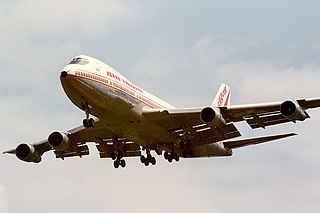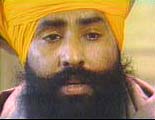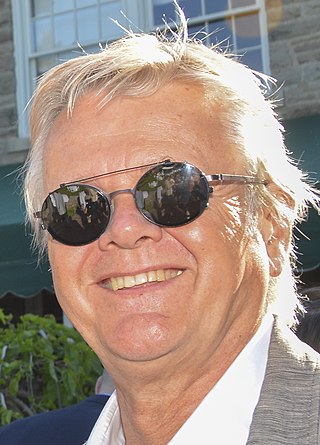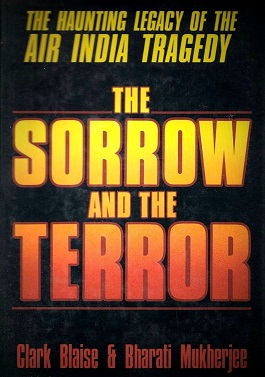
Air India Flight 182 was a passenger flight operating on the Montreal–London–Delhi–Mumbai route, that on 23 June 1985, disintegrated over the Atlantic Ocean as a result of an explosion from a bomb planted by Canadian Sikh terrorists. It was operated using a Boeing 747-237B registered VT-EFO. The incident happened en route from Montreal to London at an altitude of 31,000 feet (9,400 m). The remnants of the aircraft fell into the sea approximately 190 kilometres off the coast of Ireland, killing all 329 people on board, including 268 Canadian citizens, 27 British citizens, and 24 Indian citizens. The bombing of Air India Flight 182 is the worst terrorist attack in Canadian history, the deadliest aviation incident in the history of Air India and was the world's deadliest act of aviation terrorism until the September 11 attacks in 2001. The mastermind behind the bombing was believed to be Inderjit Singh Reyat, a dual British-Canadian national, who pleaded guilty in 2003 and Talwinder Singh Parmar, a Canadian Sikh separatist leader, who was one of the key individuals associated with the militant group Babbar Khalsa.

The 1985 Narita International Airport bombing was the attempted terrorist bombing of Air India Flight 301, which took place on June 23, 1985. A bomb hidden in a suitcase transiting through Narita International Airport, then known as New Tokyo International Airport, exploded at 06:19 in a baggage handling room, killing two baggage handlers and injuring another four. The bomb exploded prematurely while the plane was still grounded. The attack at Narita was part of an attempted double-bombing orchestrated by Talwinder Singh Parmar, a Canadian national, and the Sikh terrorist organization, Babbar Khalsa. The bombs were made by Inderjit Singh Reyat.

Talwinder Singh Parmar was a Sikh militant and the mastermind of the 1985 Air India Flight 182 bombing, which killed 329 people. It was the worst single incident of aviation terrorism in history until the September 11 attacks in the United States. In addition, another bomb was meant to explode aboard Air India Flight 301 in Japan the same day, but it exploded while the plane was still grounded, killing two people. Parmar was also the founder, leader, and Jathedar of Babbar Khalsa International (BKI), better known as Babbar Khalsa, a Sikh militant group involved in the Khalistan movement.

The Komagata Maru incident involved the Japanese steamship Komagata Maru, on which a group of people from British India attempted to immigrate to Canada in April 1914, but most were denied entry and forced to return to Budge Budge, near Calcutta. There, the Indian Imperial Police attempted to arrest the group leaders. A riot ensued, and they were fired upon by the police, resulting in some deaths.
John Zaritsky was a Canadian documentarian/filmmaker. His work has been broadcast in 35 countries and screened at more than 40 film festivals around the world; in 1983, his film Just Another Missing Kid won the Academy Award for Best Documentary Feature.

Tara Singh Hayer was an Indian-Canadian newspaper publisher and editor who was murdered after his outspoken criticism of fundamentalist violence and terrorism. In particular, he was a key witness in the trial of the Air India Flight 182 bombing.

Murder Unveiled is a 2005 Canadian television film. The movie is based on the true story of the Jaswinder Kaur Sidhu murder. The film was screened at the Asian Festival of First Films on November 26, 2005 and was first aired on CBC on February 6, 2006.

Sturla Gunnarsson is an Icelandic-Canadian film and television director and producer.
Eisha Marjara is a Canadian film director and writer. With a background in photography, Marjara has written and directed several award-winning films, including the feature documentary Desperately Seeking Helen (1998) and The Incredible Shrinking Woman (1994). Marjara's forthcoming feature film is titled Venus; it has yet to be released.

The International Sikh Youth Federation (ISYF) is a proscribed organisation that aims to establish an independent homeland for the Sikhs called Khalistan. It is banned as a terrorist organisation under Australian, Japanese, Indian, Canadian and American counter-terrorism legislation. The Government of India has declared it a terrorist organisation. While banned, the organization continues to receive financial support from many Sikh people based in Canada, the United States, and the United Kingdom.
A chief engineer for the Vancouver School Board, Hardial Singh Johal was an avid follower of Talwinder Singh Parmar, and thus closely eyed in the investigation following the bombing of Air India Flight 182. He was alleged to have stored the suitcase explosives in the basement of a Vancouver school, and to have purchased the tickets for the flights on which the bombs were placed.
Kensington Communications is a Toronto-based production company that specializes in documentary films and documentary/factual television series. Founded in 1980 by president Robert Lang, Kensington Communications Inc. has produced over 250 productions from documentary series and films to performing arts and children's specials. Since 1998, Kensington has also been involved in multi-platform interactive projects for the web and mobile devices.
The Diversity Award was a special award presented by Academy of Canadian Cinema and Television to honour excellence in English-language television programming that reflects the racial and cultural diversity of Canada". It was introduced in 1988 as the Multiculturalism Award under the umbrella of the Gemini Awards, and renamed to the Canada Award in 1993. The winner of the award was generally announced in advance of the ceremony, although the award was presented to the producers at the ceremony.
Nick Hector is a British Canadian film producer and editor, and professor of film production at the University of Windsor.

The Sorrow and the Terror: The Haunting Legacy of the Air India Tragedy is a 1987 book by Clark Blaise and Bharati Mukherjee about the Air India Flight 182 bombing in 1985. It was published by Viking Books. Both authors are naturalized Canadians; Mukherjee is an Indo-Canadian Hindu who was born an Indian citizen while Blaise was born an American citizen.

Nisha Pahuja is an Indian-born Canadian filmmaker, based in Toronto, Ontario.
The Donald Brittain Award is a Canadian television award, presented by the Academy of Canadian Cinema and Television to honour the year's best television documentary on a social or political topic. Formerly presented as part of the Gemini Awards, since 2013 it has been presented as part of the Canadian Screen Awards. The award may be presented to either a standalone broadcast of a documentary film, or to an individual full-length episode of a news or documentary series; documentary films which originally premiered theatrically, but were not already submitted for consideration in a CSA film category before being broadcast on television, are also considered television films for the purposes of the award.

Sher Vancouver is a registered charity in Metro Vancouver, British Columbia, Canada for lesbian, gay, bisexual, transgender, and queer South Asians and their friends. The full name of the organization is the Sher Vancouver LGBTQ Friends Society. The society was originally founded as an online Yahoo group for LGBTQ Sikhs in April 2008 by social worker Alex Sangha of Delta, B.C.
Shelley Saywell is a Canadian documentary filmmaker, most noted as a three-time winner of the Hot Docs Award for Best Canadian Feature Documentary.
Tiger Spirit is a Canadian documentary film, directed by Min Sook Lee and released in 2008. Inspired in part by Lee's efforts to learn more about her own family background after it was fractured by the division of Korea, the film explores the complicated prospects for Korean reunification through various angles, including North Korea's 2000s lottery system that allowed some South Korean residents to visit North Korean relatives, and the efforts of South Korean journalist Lim Sun Nam to find proof of his beliefs that the Siberian tiger is not actually extinct in Korea, and that the Korean people will be healed and reunited after he finds one.










